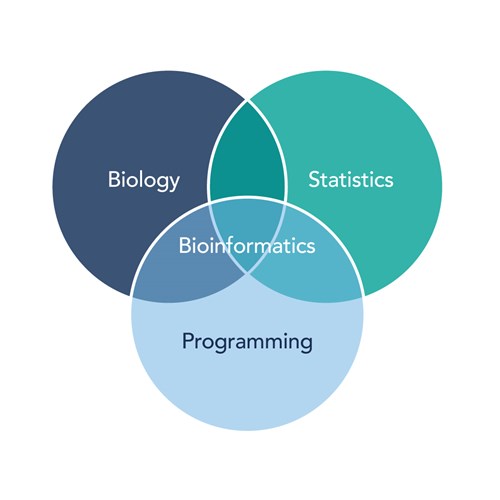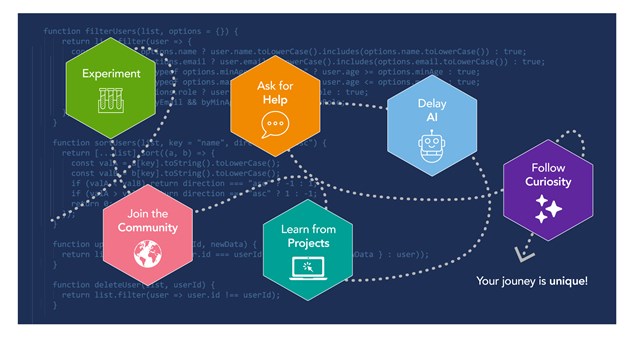Tips on your coding journey as a PhD student
Written by María Bueno Álvez, PhD candidate at Science for Life Laboratory
Learning to code can feel incredibly intimidating, particularly in fields like bioinformatics, where many students come from biology or medicine rather than computer science or statistics. While there are countless resources available, the path to proficiency is rarely straightforward. Progress often requires a combination of structured learning, trial and error, and connecting with a community of peers. Here are a few strategies that can make navigating your coding journey as a PhD student more effective and enjoyable.

Figure 1: Bioinformatics is a discipline that uses programming and statistics to analyze biological questions.
1: Experiment and find what works for you
Many researchers in bioinformatics begin with little or no formal training in computer science and often need to learn coding from scratch. Introductory courses, offered by universities or online platforms, provide a structured way to learn the fundamentals. There are also plenty of free resources available, such as the Introduction to R for Life Scientists course by Proteintech. Python and R are the most widely used programming languages in bioinformatics, and starting with one of them is generally recommended. However, “traditional” learning through courses or textbooks is not the only path. For some learners, a more practical, hands-on approach works best, such as following coding blogs (find an example here), engaging with online tutorials, or watching YouTube videos. There are many paths to building coding skills, and the key is to experiment and identify what matches your learning style.
2: Join community challenges and embrace social media
There’s a large community dedicated to making coding more engaging and rewarding. One example is the #TidyTuesday challenge, where the R community releases a new dataset every week on GitHub and participants share their visualizations and code on social platforms like Twitter or LinkedIn. Engaging with challenges like this can introduce new techniques, provide inspiration for visualizing data, and create opportunities to connect with other programmers sharing tips and best practices. Beyond challenges, there is a wide range of online material – tutorials, podcasts (e.g., here), forums, and social media communities – that can help make your coding journey more interactive and motivating, no matter your field.
3: Find a project that aligns with your interests
Beginner coding exercises, such as printing “Hello, World!” or reproducing the Fibonacci sequence, are useful for learning syntax and basic logic, but they often feel disconnected from real-world applications. To stay motivated, it can be helpful to find a project that aligns with your interests. Online repositories offer many opportunities to reproduce, expand, or contribute to research projects. Following well-documented online tutorials is an effective way to learn without feeling overwhelmed. Reproducing previous work helps build confidence in your coding skills, and adding your own lines of code can further strengthen your understanding and problem-solving abilities.
4: Build a strong foundation before relying on AI
With AI tools readily available, it can be tempting to rely on them for generating code early in the learning process. While these tools are incredibly useful and have greatly advanced the field, it can be beneficial for new coders to first develop a solid understanding of programming concepts independently. This foundation will make it easier to use AI effectively. For example, tools like GitHub Copilot can help fill gaps in code to generate plots, but a solid understanding of the underlying packages (like ggplot in R) is essential to interpret and adapt the autocompleted code. Relying solely on AI too early can lead to gaps in foundational knowledge, so it is generally advisable to combine AI assistance with independent learning.
5: Find help
Connecting with others is one of the most effective ways to improve coding skills. This is not limited to colleagues; there are great platforms like Stack Overflow, GitHub, and dedicated coding forums where you can connect, discuss, and browse through past interactions. Chances are, someone has faced the same issue you're dealing with, and while a simple Google search might not always provide the most targeted solution, these communities can offer exactly what you need. Sharing your code is also valuable, especially once you're further along and working on projects. You can receive incredibly valuable feedback from people working on similar problems around the world, and it makes the journey less isolating.
6: Stick to what feels exciting
There is a lot of material available when learning to code, which can feel overwhelming and make it hard to prioritize or decide which path to follow. One effective strategy is to start with topics or projects that feel the most engaging in the moment, such as exploring a dataset that interests you, solving small coding challenges (you can find an example here), or working through fun visualization projects. Focusing on approachable tasks like these can help to build motivation and confidence. What feels exciting will shift as you grow, and being open to exploring new challenges is one of the best ways to develop as a bioinformatician.

Figure 2: Tips for your unique coding journey.
In conclusion, your journey is unique
What matters is experimenting with different approaches, following what keeps you motivated, and gradually building a solid foundation. The knowledge will consolidate over time; you'll start spotting gaps in your understanding and can always take more targeted courses later. Most importantly, treat coding as a skill that grows with practice and opens up new opportunities in your research!
Related Content
Introduction to R for Life Scientists
Introduction to R programming for life-scientists | Proteintech Group
Statistics for Life Scientists
Support
Newsletter Signup
Stay up-to-date with our latest news and events. New to Proteintech? Get 10% off your first order when you sign up.

